An article in the Book section of the Toronto Star recently caught my interest. It was actually a list of books that were deemed Cocktail Party Fodder. One of the titles mentioned was How To Watch A Movie by David Thomson. In case you are not aware, David Thomson is a well-respected movie critic. He has written about movies in The Guardian, The Independent, The New York Times, The New Republic, Salon, Movieline, Film Comment, and Sight & Sound. Not to mention the fact that he is the author of more than 30 books on film.
If David Thomson offers us tips on how to watch a movie, we should all take advantage of his advice.
How To Watch A Movie by David Thomson (2015):
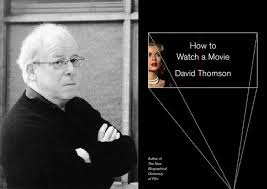
From one of the most admired critics of our time, comes brilliant insights into the act of watching movies and an enlightening discussion about how to derive more from any film experience.
Since first publishing his landmark Biographical Dictionary of Film in 1975 (recently released in its sixth edition), David Thomson has been one of our most provocative authorities on all things cinema. Now he offers his most inventive exploration of the medium yet: guiding us through each element of the viewing experience, considering the significance of everything from what we see and hear on-screen—actors, shots, cuts, dialogue, music—to the specifics of how, where, and with whom we do the viewing.
With customary candor and wit, Thomson delivers keen analyses of a range of films from classics such as Psycho and Citizen Kane to contemporary fare such as 12 Years a Slave and All Is Lost, revealing how to more deeply appreciate both the artistry and (yes) manipulation of film, and how watching movies approaches something like watching life itself.
Discerning, funny, and utterly unique, How to Watch a Movie is a welcome twist on a classic proverb: Give a movie fan a film, she’ll be entertained for an hour or two; teach a movie fan to watch, his experience will be enriched forever. – Publisher Summary
Other new books about movies to capture your interest (and a couple of my older favourites):
Do The Movies Have A Future? by David Denby (2012)
In the second decade of the twenty-first century, the movies, once America’s primary popular art form, have become an endangered species. Do the Movies Have a Future? is a rousing and witty call to arms. In these sharp and engaging essays and reviews, New Yorker movie critic David Denby weighs in on “conglomerate aesthetics,” as embodied in the frenzied, weightless action spectacles that dominate the world’s attention, and “platform agnosticism,” the notion that movies can be watched on smaller and smaller screens: laptops, tablets, even phones. 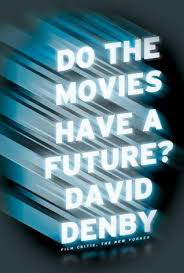 At the same time, Denby reaffirms that movies are our national theater, and in this exhilarating book he celebrates such central big movies as Avatar and The Social Network as well as small but resonant triumphs like There Will Be Blood and The Tree of Life.
At the same time, Denby reaffirms that movies are our national theater, and in this exhilarating book he celebrates such central big movies as Avatar and The Social Network as well as small but resonant triumphs like There Will Be Blood and The Tree of Life.
Denby joyously celebrates what remains of the shared culture in romantic comedy, high school movies, and chick flicks; he assesses the expressive triumphs and failures of auteurs Quentin Tarantino, the Coen brothers, Pedro Almodóvar, and David Fincher. Refusing nostalgia, he mines the past for strength, examining the changing nature of stardom and the careers of Joan Crawford, Otto Preminger, and Victor Fleming, and the continuing self-invention of Clint Eastwood. And he recreates the excitement of reading two critics who embodied the film culture of their times, James Agee and Pauline Kael.
Wry, passionate, and incisive, Do the Movies Have a Future? is both a feast of good writing and a challenge to fight back. It is an essential guide for movie lovers looking for ammunition and hope. – Publisher’s Summary
The Film Club: A True Story of a Father and Son by David Gilmour (2007)
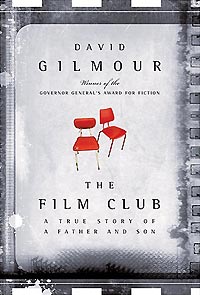 From the 2005 winner of the Governor-General’s Award for Fiction and the former national film critic for CBC television comes a delightful and absorbing book about the agonies and joys of home-schooling a beloved son. Written in the spare elegant style he is known for, The Film Club is the true story about David Gilmour’s decision to let his 15-year-old son drop out of high school on the condition that the boy agrees to watch three films a week with him. The book examines how those pivotal years changed both their lives.
From the 2005 winner of the Governor-General’s Award for Fiction and the former national film critic for CBC television comes a delightful and absorbing book about the agonies and joys of home-schooling a beloved son. Written in the spare elegant style he is known for, The Film Club is the true story about David Gilmour’s decision to let his 15-year-old son drop out of high school on the condition that the boy agrees to watch three films a week with him. The book examines how those pivotal years changed both their lives.
From French New Wave, Kurosawa, and New German cinema, to De Palma, film noir, Cronenberg and Billy Wilder, among many others from world cinema, we read about key moments in each film, as the author teaches his son about life and the vagaries of growing up through the power of the movies. Replete with page-turning descriptions of scenes and actors and directors, the narrative is framed with the tender story of his son’s first bittersweet first loves.
This is a charming and poignant story about a very special time in a father and son’s relationship. David Gilmour is a novelist who has earned critical praise from literary figures as diverse as William Burroughs and Northrop Frye, and from publications as different as the New York Times to People magazine. The author of six novels, he also hosted the award-winning Gilmour on the Arts. He lives in Toronto with his wife Tina Gladstone. – Publisher’s Summary
Movie Star Chronicles: A Visual History of the World’s Greatest Movie Stars by Ian Haydn Smith (2015)
Movie Star Chronicles promises to satisfy the curiosity of moviegoers, cinephiles, and the Hollywood-hungry fans that fuel today’s entertainment news industry. 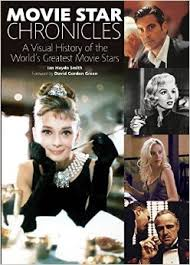 For film students, it is a practical reference to the most important actors in cinematic history.
For film students, it is a practical reference to the most important actors in cinematic history.
Entries illustrated with film and television stills and other archival material chart the careers of 330 actors from the era of silent film to today’s blockbusters. Expert text gives an entertaining overview and color-coded timelines provide an at-a-glance guide to the actor’s career, their roles, movie release dates, earnings and awards.
Covering Hollywood, Bollywood and world cinema, Movie Star Chronicles is truly international and comprehensive. – Publisher’s Summary
Silver Screen Fiend: Learning About Life From An Addiction To Film by Patton Oswalt (2015)
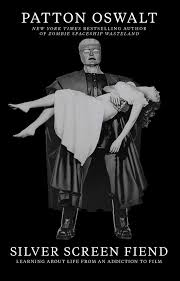 New York Times bestselling author, comedian, and actor Patton Oswalt shares his entertaining memoir about coming of age as a performer and writer in the late ’90s while obsessively watching classic films at the legendary New Beverly Cinema in Los Angeles.
New York Times bestselling author, comedian, and actor Patton Oswalt shares his entertaining memoir about coming of age as a performer and writer in the late ’90s while obsessively watching classic films at the legendary New Beverly Cinema in Los Angeles.
Between 1995 and 1999, Patton Oswalt lived with an unshakeable addiction. It wasn’t drugs, alcohol, or sex. It was film. After moving to L.A., Oswalt became a huge film buff, absorbing classics and new releases at least three nights a week at the New Beverly Cinema. Silver screen celluloid became Patton’s life schoolbook, informing his notions of acting, writing, comedy, and relationships. Set in the nascent days of the alternative comedy scene, Oswalt’s memoir chronicles his journey from fledgling stand-up comedian to self-assured sitcom actor, with the colorful New Beverly collective supporting him all along the way.
Ideally timed for awards season, when everyone’s mind is on Hollywood, Silver Screen Fiend follows up on the terrific reception of Oswalt’s New York Times bestselling debut, Zombie Spaceship Wasteland. Already a beloved fixture on the comedy stage, on television, and in film—not to mention his 1.87 million Twitter followers—Oswalt announces, with this second book, that he’s also here to stay on the page. – Publisher’s Summary
